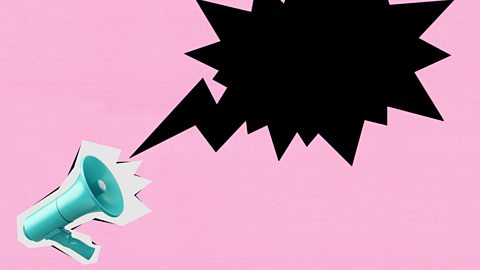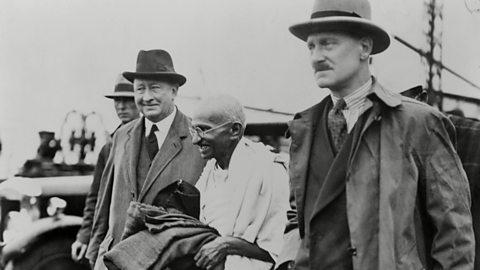From screens to public transport, it can really feel like marketing is everywhere.
We likely come across hundreds of adverts a week in one form or another, and it would be impossible to remember them all.
But sometimes a clever slogan can go beyond its goal of grabbing a viewer's attention, and actually become part of daily language.
You may recognise some of these phrases but not realise they originated from adverts. 91╚╚▒Č Bitesize explores how some of them came about.

1. 'Does exactly what is says on the tin'
In 1994, Dave Shelton and Liz Whiston were tasked with creating an advertising campaign which would help wood varnish company Ronseal make a lasting impression.
They decided to focus on a simple and to the point television advert - something unusual for the time, with flashy slogans being common.
The pair needed a punchy tagline to finish the ad. 'Does exactly what it says on the tin' was initially used as a placeholder - until they realised that, after all, it was just what they needed.
The line, however, nearly didnÔÇÖt make it to the final script after some negative results in the audience testing phase. In a twist of fate, the then marketing director of Ronseal, Ged Shields, decided to run the adverts unchanged.
It turned out to be a good move. Not only did Ronseal sales shoot up, but the adverts themselves became the source of inspiration for spoofs by other companies, paving the way for the slogan's entry into everyday language in Britain.
In 2013, former Prime Minster David Cameron used it to describe the coalition government arrangements between the Conservatives and Liberal Democrats, declaring it "a Ronseal deal - it does what it says on the tin.".

2. 'Diamonds are forever'
In 1947, luxury jewellery company De Beers was aiming to boost the sales of diamonds, which had plummeted during the Great Depression, when the US economy went into a period of deep economic and social distress.
Copywriter Frances Gerety came up with the slogan 'A diamond is forever' late one night in 1947, perhaps not quite imagining what it would go on to represent.
Despite some initial concerns over the slightly unusual turn of phrase, De Beers started running it as their tagline. Almost eight decades later, it is still in use today.
At the time buying a diamond engagement ring wasnÔÇÖt as common as it is today, but the campaign successfully increased sales by creating the connection between a diamond (and its size) and true, everlasting love.
Likely inspired by the De Beers adverts, Diamonds Are Forever was the title of the fourth James Bond book written by Ian Fleming in 1956, which was then adapted into a film starring Sean Connery in 1971.
Its theme song was sung by Shirley Bassey, who became the first artist to record two Bond themes after her enormously successful 1964 track Goldfinger.

3. ÔÇśAlways the bridesmaid, never the brideÔÇÖ
Another slogan related to love and marriage, although the product advertised in this case may be something you may not immediately associate with romance.
Songwriters Fred Leigh and Charles Collins were likely the first to popularise a similar phrase when they wrote their 1917 song Why Am I Always the Bridesmaid?, made famous by English music hall performer Lily Morris.
Fast-forward to the mid-1920s, when mouthwash company Listerine ran a full-page newspaper campaign which read ÔÇťoften a bridesmaid, never a brideÔÇŁ. The idea was that fresh breath was the key to receiving a marriage proposal - something elusive for the advert's fictional female protagonist.
This approach became known in the marketing world as 'halitosis appeal', as it used the fear of bad breath, particularly among women, as a way to sell a product that was painted as a remedy.
To this day, 'always the bridesmaid, never the bride' remains a common phrase to describe the repeated falling short of success - for example a sporting team who regularly get to finals, but rarely or never win the trophy.

4. ÔÇśQuality never goes out of styleÔÇÖ
Levi Strauss & Co. began running the advertising slogan 'quality never goes out of style' in the 1980s - and it remains one of their most successful in their 170-year-long history.
It emphasised two key features the American company wanted to associate with its product - quality and style - and was used in several television and print ads. The catchy tagline helped Levi's cement its reputation as one of the biggest names in the world of denim.
Today, similar phrases are used to describe something which is not subject to trends and will remain timeless. Levi's also regularly use the slogan, tweaking the first part, to highlight some of its broader initiatives.
The phrase now features on the inside labels of their jeans - perhaps a nod to the rise of fast fashion and the importance of using garments for as long as possible.
This article was published in November 2024
Looking for quizzes, amazing stories and fun facts?
Bitesize Topical has it all!

Six movie quotes that are victims of the ÔÇśMandela EffectÔÇÖ
You may be surprised at how many famous lines from movies we get wrong!

Quiz: How well do you know these famous quotes?
You know a quote is truly quotable when it stands the test of time. So how well do you know these famous words?

Five historical quotes that we probably misquote
History is a rich tapestry of inspiring and meaningful sayings... including some that were entirely made up!
